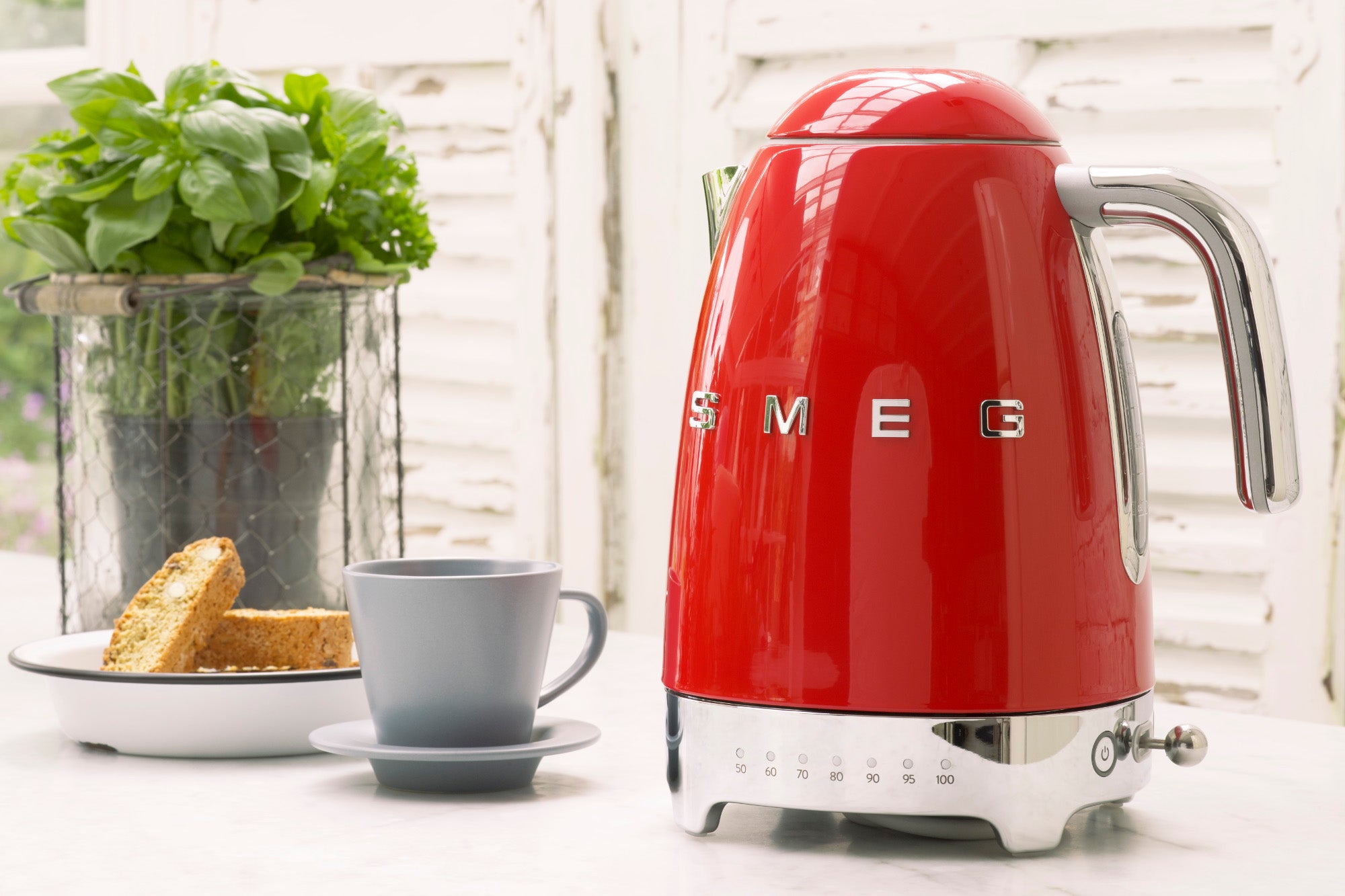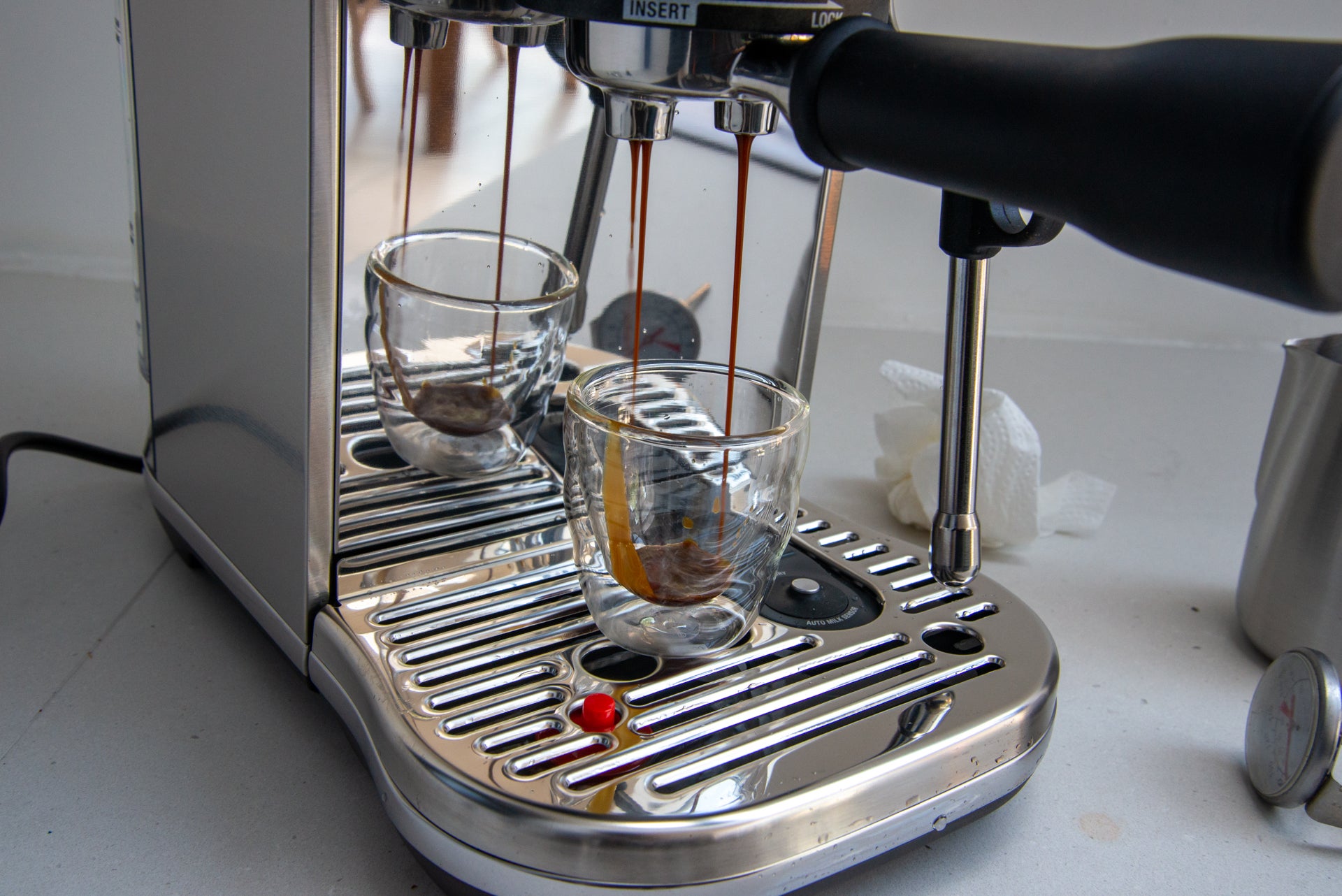Skuma Water Review
Doesn't just purify, but makes water better.
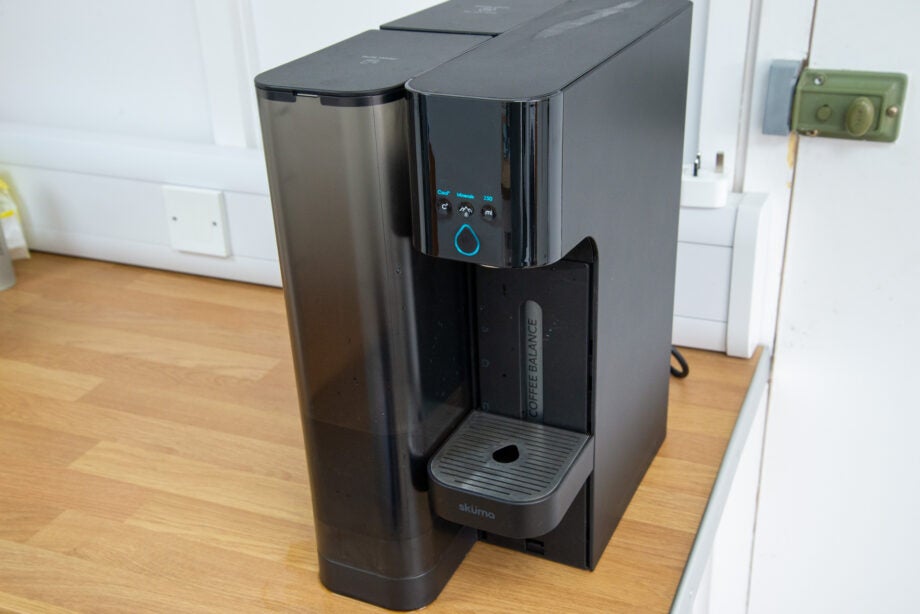

Verdict
For those that really care about the water that they drink, Skuma Water isn’t just another filter: it cleans up your water and then adds minerals back in. With infusions for hydration, coffee and more, this is a flexible machine that delivers the best water for a variety of jobs. It works brilliantly to clean up water, and can even provide hot water that’s suitable for coffee. It is quite loud and build quality could be better, but it’s a useful tool for those that want flavoursome, healthier water.
Pros
- Creates very pure water
- Large capacity
- Infusions boost water taste and content
Cons
- Loud
- Waste tank needs emptying often
Availability
- UKRRP: £347
Key Features
- PurificationUses reverse osmosis and a water filter to purify water.
- Added mineralsOptional infusions add minerals to purified water.
Introduction
Water is never really just ‘water’. Try water from different taps around the country and it will taste different, based on the composition of the water and what’s in it.
Water filters are designed to filter out anything bad, but Skuma goes one step further as it filters and has optional infusions that add minerals back into the final water.
From improving hydration to boosting the taste of coffee, the Skuma System is unlike other water filtering systems.
Design and features
- Hot and cold water
- Has a waste tank as well as a fresh tank
- Optional infusions
Unlike most water filters, which are either available in jug form or in-line, such as on the InSinkErator 4N1 Touch tap, the Skuma Water system is a countertop device that needs to be plugged in to work. It’s a chunky beast of a machine, so it needs a fair amount of space.
As with other water filtration systems, the Skuma System requires a filtration cartridge, which screws in at the top of the machine. Replacements cost £40, but as they last for up to 750-litres of tap or hard water, you should only ever need to replace it yearly when the light comes on. That works out at just over 5p per litre of filtered water.
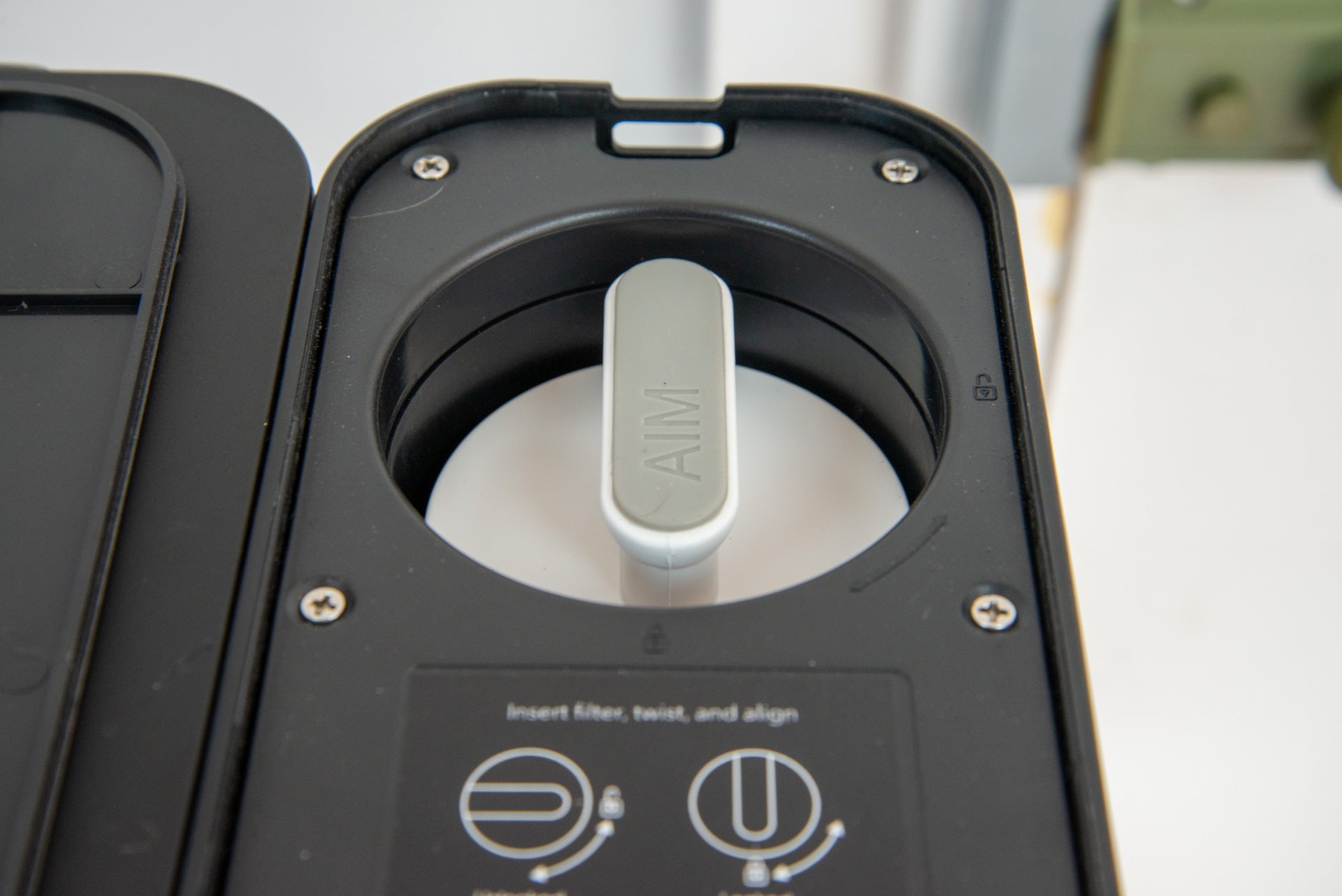
There’s a three-stage filtration process at work inside the Skuma. First there’s sediment removal, which removes sand and suspended particles present in tap water; secondly, there’s carbon filtration, which chlorine and volatile organic compounds (VOCs); finally, there’s reverse osmosis, which removes bacteria, viruses, hardness, fluoride and heavy metals from tap water.
A side effect of reverse osmosis is that it produces waste water at a ratio of 1:4 (for every four litres of fresh water, one litre of waste water is produced). Although you can’t drink the waste, Skuma’s preferred name of plant water makes sense, as you can use this water to feed your plants.
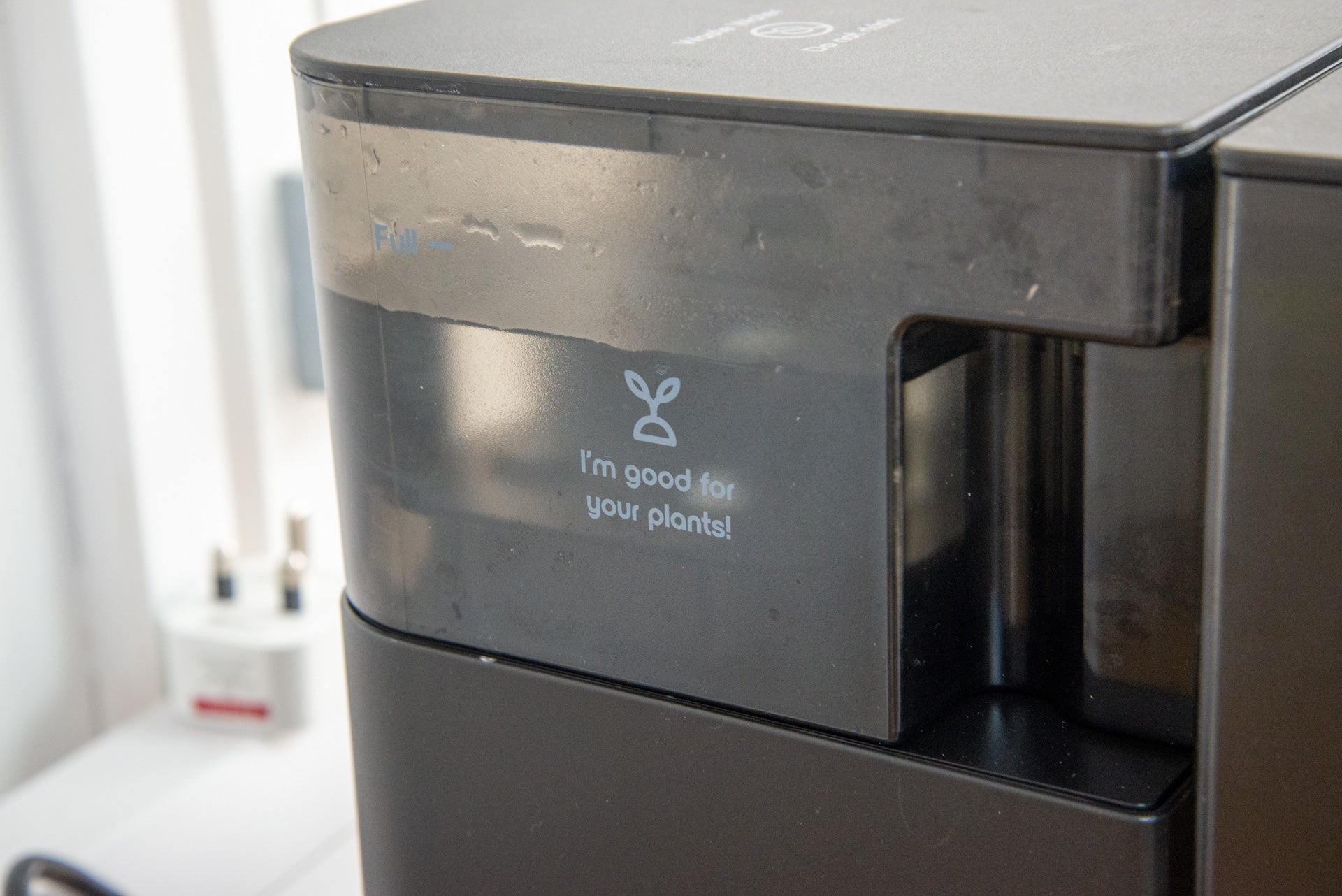
Through the process of reverse osmosis, the wastewater has a high Total Dissolved Solids (TDS) concentration. Measuring my waste tank, I got a reading of 895, which is about four times what you’d expect from a UK tap, and unsafe to drink. Yet, the high mineral content is good for plants.
Once the water is purified, Skuma can take bottles of infusions to add helpful minerals back in. Each infusion costs £18 (subscriptions lower the cost by 20%) but lasts for 60-litres of water. At full price that’s 30p per litre of infused water.
Skuma sells various infusions depending on what you want, and the bottles can be swapped at will, clipping in behind a slightly cheap-feeling plastic cover. Hydration Boost adds magnesium, potassium and calcium into the mix; Coffee Boost adds magnesium and bicarbonate (both as CaCO3, or calcium carbonate), which are designed to enhance the taste of coffee.
Infusions should be plugged in firmly until the light comes on.
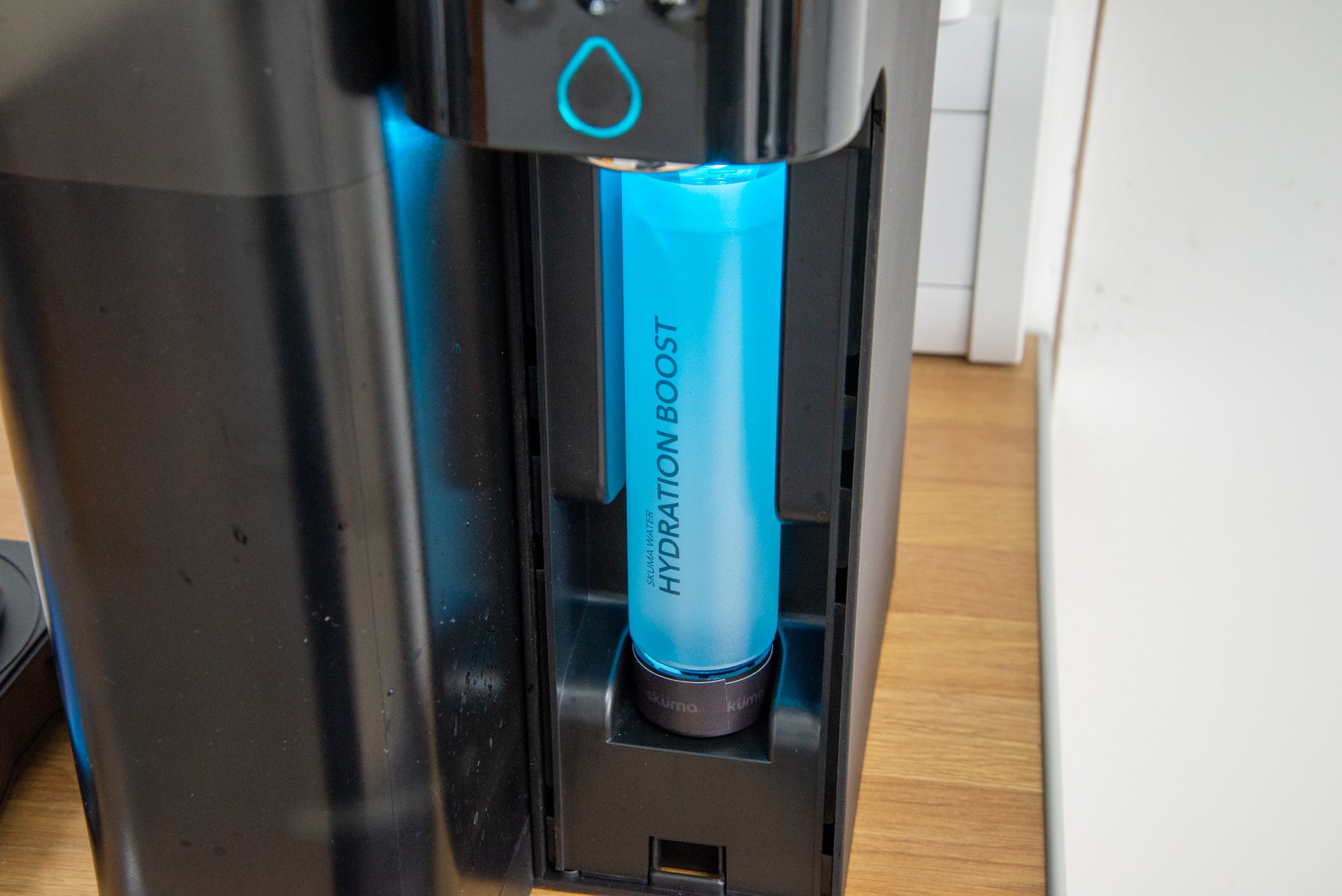
Using the Skuma is straightforward. First, the five-litre water tank must be filled and connected to the machine. On my review model, the tank sat at a slight angle. With the tank in position an initial flushing procedure takes place, which involves a few empties of the plant water tank.
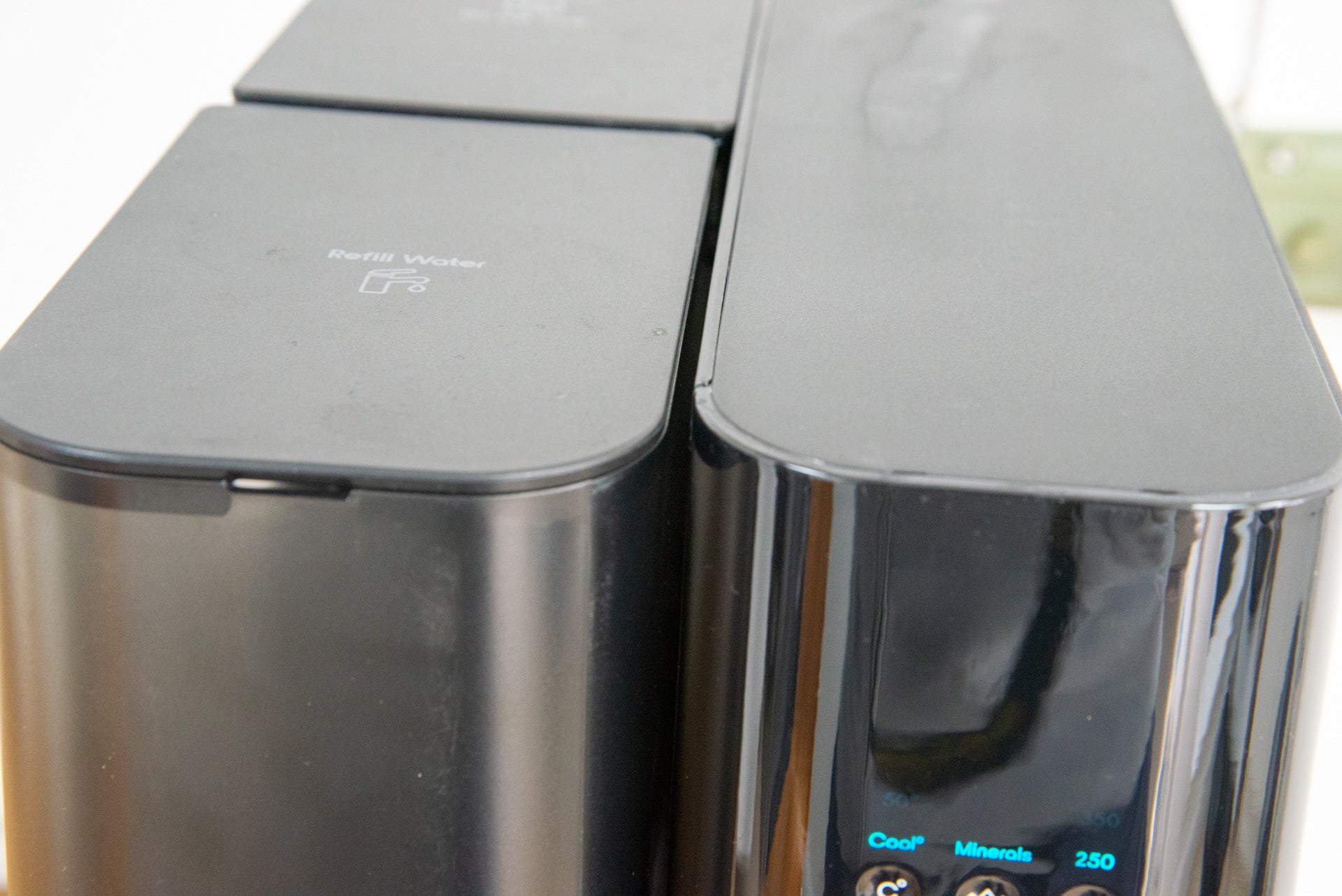
After that, the system is good to go. I found the Skuma Water system easy to use. There’s a simple touch panel on the front. For cold water, there’s a choice to add minerals from the installed infusion or just to dispense filtered water.
Then, there’s a choice of dispense volume: 250ml, 350ml, 500ml, 1-litre or unlimited – any water dispensing can be cancelled at a second touch of the dispense button.
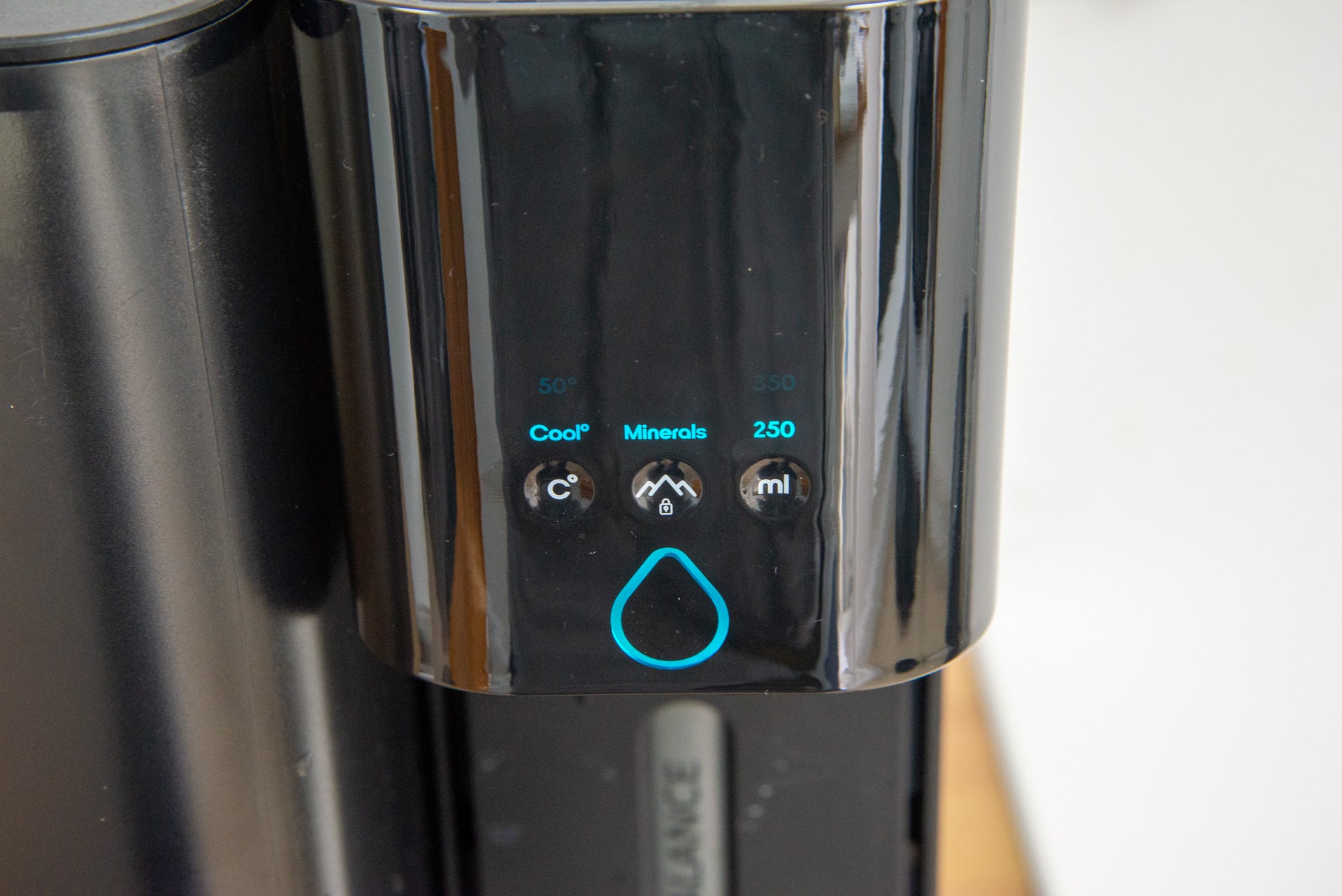
A drip tray can be installed at different heights under the spout to suit different glass sizes, but the water tank sits slightly in the way, so you may struggle to fit in a wide tank from a coffee machine or similar.
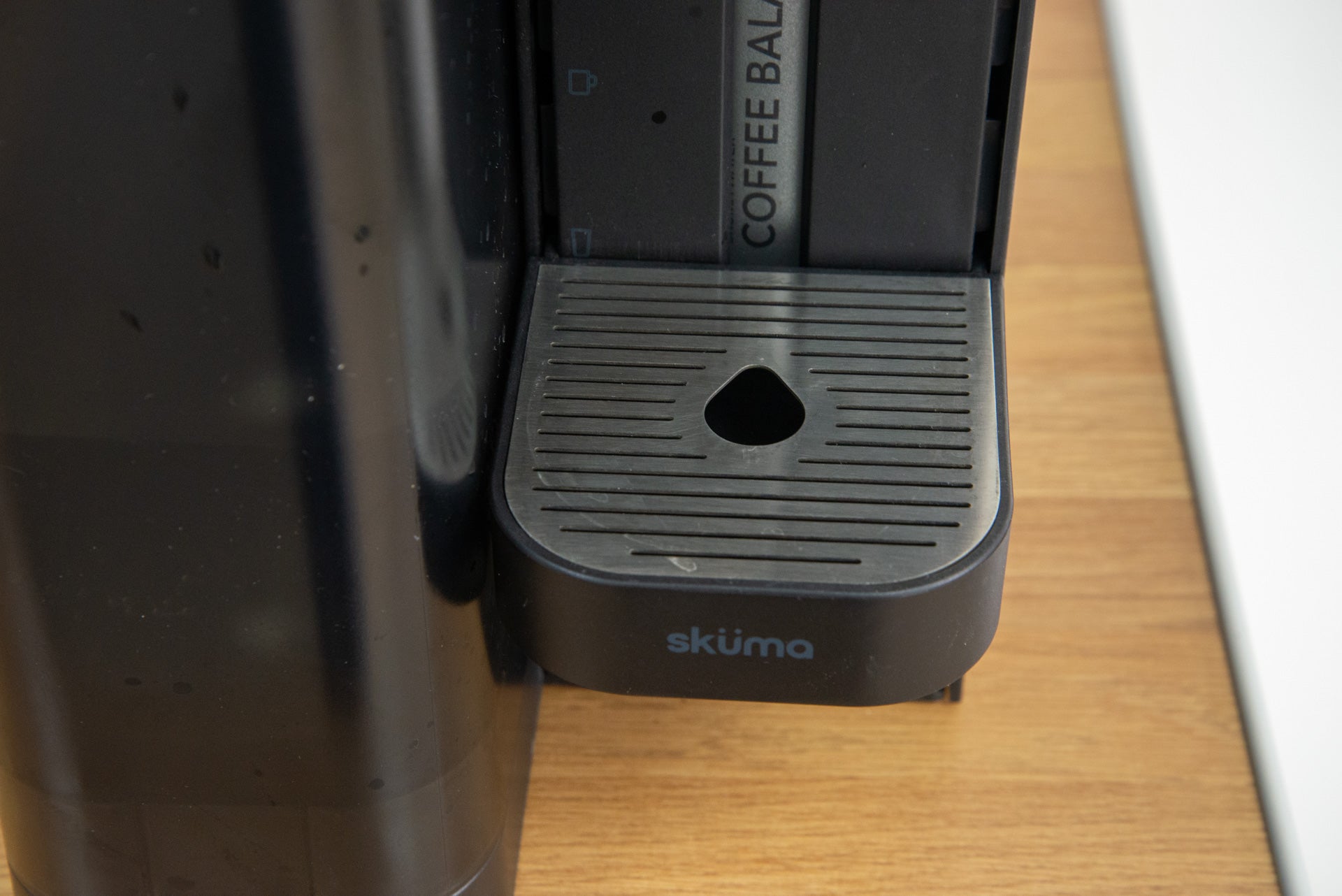
Due to the way that the Skuma Water filters, there is a limit on how much water it can deliver. Using a 750ml glass bottle (available for £17), I found that the first bottle filled up, but the second bottle only got around a third-full before the Skuma turned off. I had to wait for it to go through its purification process again.
While purifying, the Skuma makes a noise like a little generator and it’s loud, distractingly so. How long it runs for depends on how much water was dispensed. After dispensing 1-litre of filtered water, the Skuma Water system purified for 3m 15s.
There are warning lights that tell you when the plant water tank needs emptying and the fresh water tank needs filling. For the latter, I found that the tank was never actually empty, with a fair bit of water sloshing around in the bottom.
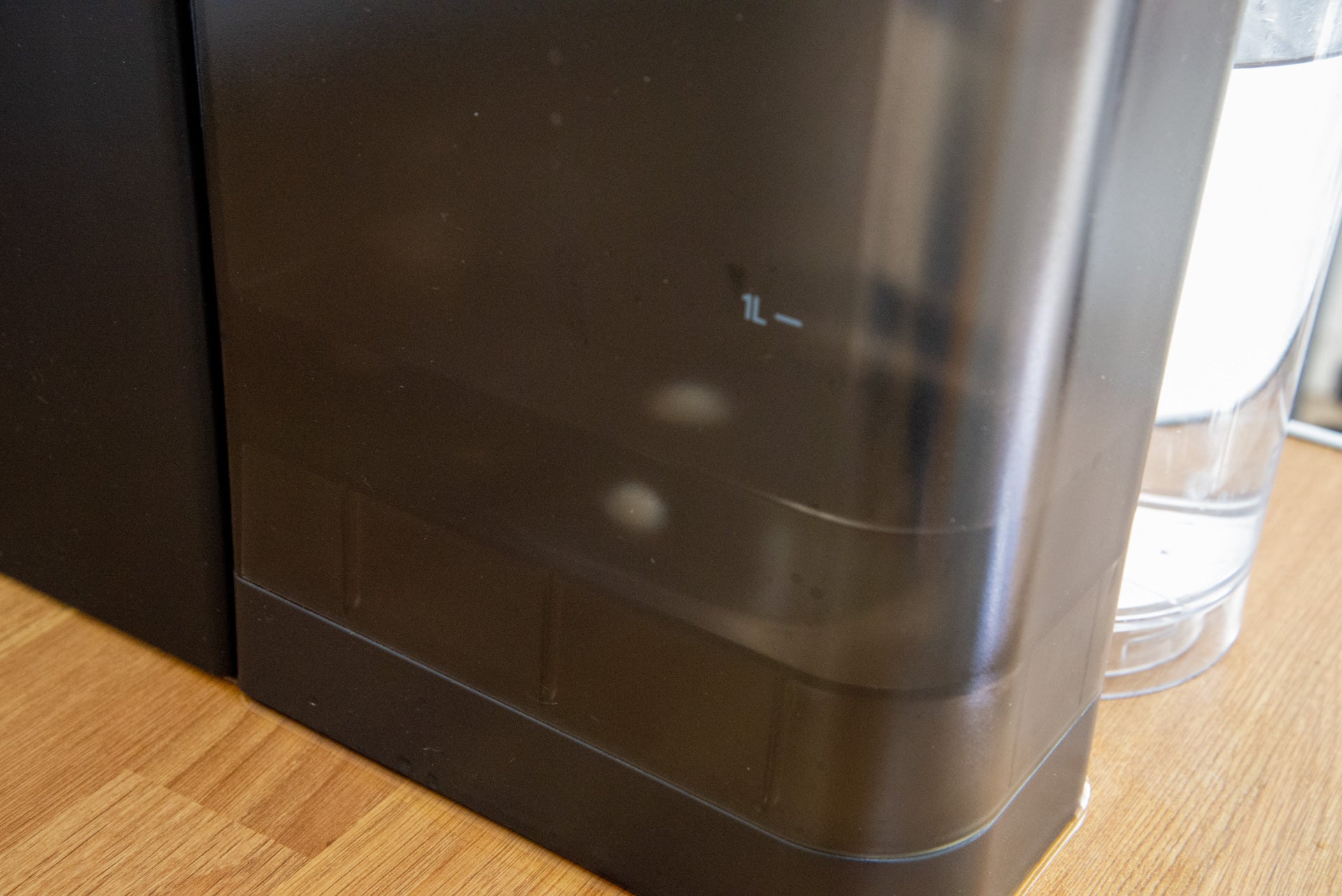
There’s also hot water available, both with and without an Infusion. Temperatures include 50C, 75C, 85C and Max. Water is heated as it comes out, so it’s an efficient way to make hot water.
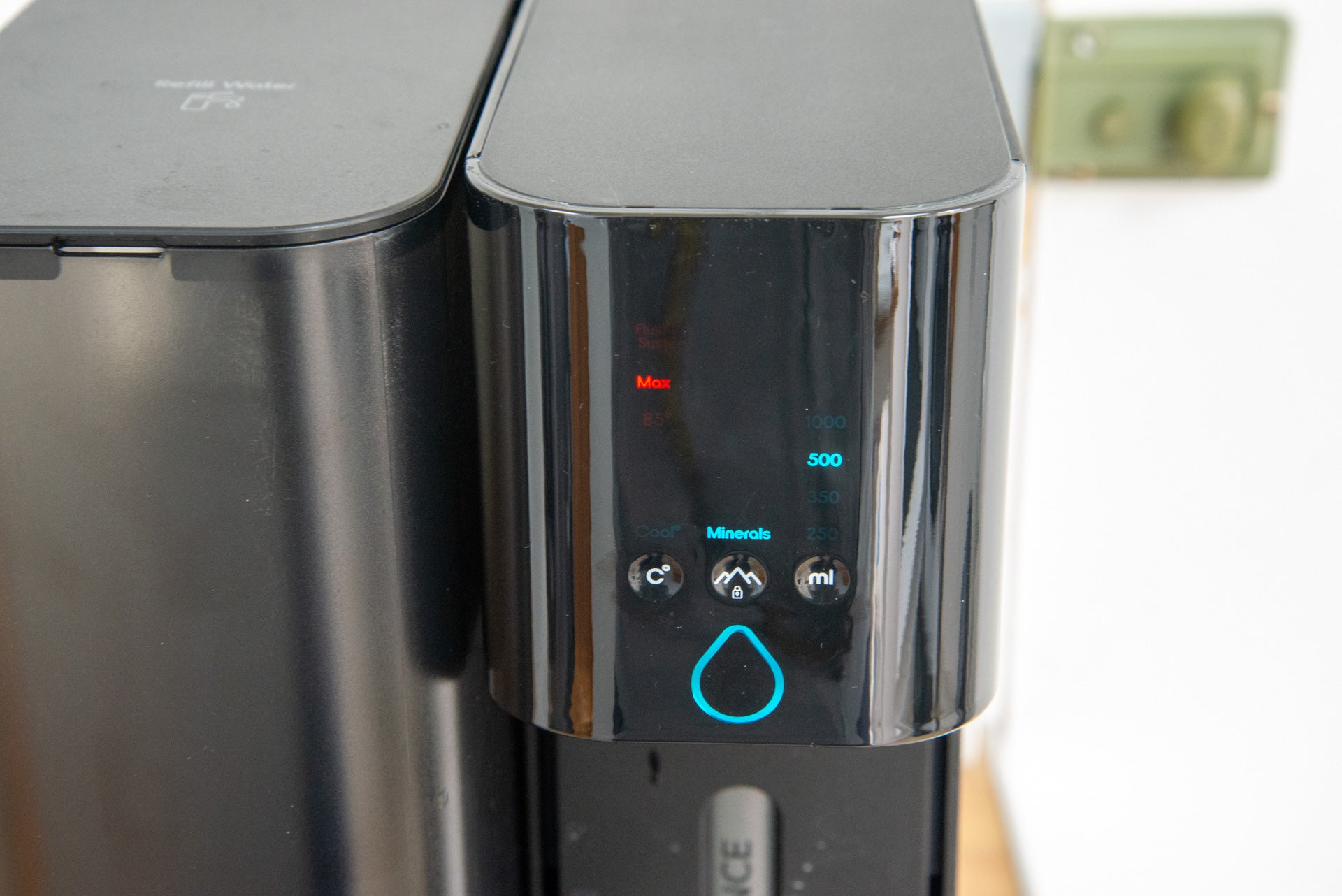
Performance
- Excellent filtration
- Infusions improve water flavour
One measure of water quality is through its level of TDS. These solids are anything that have dissolved in the water and can contain elements from sewerage, chemicals used in the treatment process, fertilisers, and other minerals that the water picks up.
A TDS level of 300ppm or below is considered safe, but the lower the better. Water above 500ppm is considered the maximum level accepted by the US Environmental Protection Agency, while levels of 1000ppm are considered unsafe.
It’s the solids in water that gives it its taste, and helps explain why water tastes different in different parts of the country.
Measuring my tap water, I got a relatively high reading of 288ppm. Running water through the Skuma system, my water had a reading of just 39ppm, which is exceptionally clean. Only the ZeroWater filter does better, giving me a reading of 0ppm.
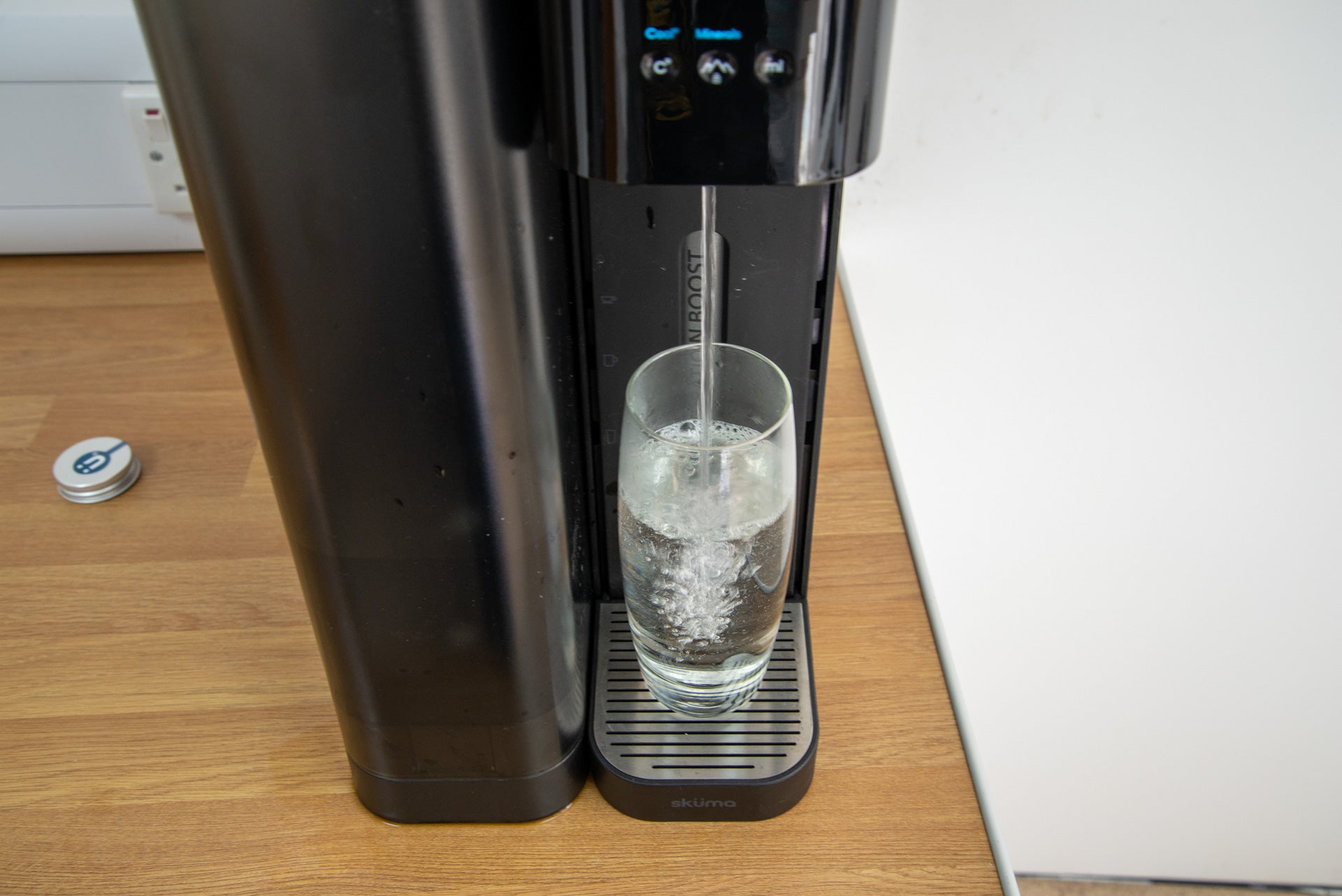
The infusions are quite impressive. Technical details aside of how the body needs more than just water for hydration, the Hydration Boost infusion delivers excellent-quality water. While pure filtered water can taste a bit bland and empty, Hydration Boost tastes much better, like a high-quality mineral water, which is what the Skuma is producing, really. If you like drinking water and crave more than just filtered or tap, this is an excellent system.
Moving on to the Coffee Boost, I made two identical cups of coffee in a Nespresso Vertuo Next machine: one with filtered water and one with Coffee Boost. The results with Coffee Boost were subtle but noticeable: the final drink was a touch brighter and smoother, with a hint less bitterness. What you drink and how you make it will make a difference, but if you’re serious about coffee, then water is one of the most important ingredients in the final cup.
Hot water is potentially useful. I measured the Skuma at a maximum of 1600W while dispensing hot water on the maximum setting, before dropping down to its normal level of a 2.5W draw. Measuring dispensing a cup of hot water (250ml), I registered a total of 0.014kWh of power or 0.5p. That’s competitive against a kettle, but for a reason.
The temperature markings on the Skuma System are at the spout, not what hits the cup. Even dispensing into a warm cup, I measured the water temperature at a maximum of 72°C, while my hot water tap delivered 87°C (and it’s actually closer to 100°C in the tank). At this kind of temperature, I would use the Skuma for making coffee, but I wouldn’t for teas.
When purifying, the Skuma drew 25W of power, dropping back to 2.5W when sat idle. That’s not particularly expensive for filtering water.
Latest deals
Should you buy it?
You’re serious about your water’s taste:
This machine filters water and adds minerals, boosting flavour and content.
You just want purified water:
In this case, a traditional jug filter will do the job.
Final Thoughts
I’ve not reviewed anything quite like the Skuma Water before. It filters water better than many traditional water filters but, unlike those, it has the option to add minerals back into the mix, improving the quality of the final product. If you’re a heavy mineral water drinker, this is a simpler way to get the same results, with far less wastage. As good as the system is, build quality could be better, and I’d prefer the system to be quieter.
How we test
We test every water filter we review thoroughly over an extended period of time. We use standard tests to compare features properly. We’ll always tell you what we find. We never, ever, accept money to review a product.
Find out more about how we test in our ethics policy.
Used as our main water filter for the review period
We use a TDS tester to see, before and after, the amount of total disolved solids in the water.
We use purified water in a variety of different scenarios to see how it tastes.
FAQs
It uses a combination of a traditional water filter and reverse osmosis.
These add minerals into the purified water.

